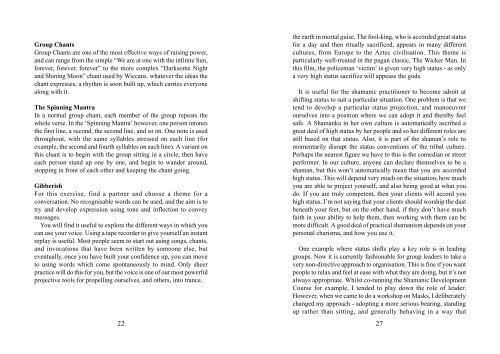Create successful ePaper yourself
Turn your PDF publications into a flip-book with our unique Google optimized e-Paper software.
Group Chants<br />
Group Chants are one <strong>of</strong> <strong>the</strong> most effective ways <strong>of</strong> raising power,<br />
and can range from <strong>the</strong> simple “We are at one with <strong>the</strong> infinite Sun,<br />
forever, forever, forever” to <strong>the</strong> more complex “Darksome Night<br />
and Shining Moon” chant used by Wiccans. whatever <strong>the</strong> ideas <strong>the</strong><br />
chant expresses, a rhythm is soon built up, which carries everyone<br />
along with it.<br />
The Spinning Mantra<br />
In a normal group chant, each member <strong>of</strong> <strong>the</strong> group repeats <strong>the</strong><br />
whole verse. In <strong>the</strong> ‘Spinning Mantra’ however, one person intones<br />
<strong>the</strong> first line, a second, <strong>the</strong> second line, and so on. One note is used<br />
throughout, with <strong>the</strong> same syllables stressed on each line (for<br />
example, <strong>the</strong> second and fourth syllables on each line). A variant on<br />
this chant is to begin with <strong>the</strong> group sitting in a circle, <strong>the</strong>n have<br />
each person stand up one by one, and begin to wander around,<br />
stopping in front <strong>of</strong> each o<strong>the</strong>r and keeping <strong>the</strong> chant going.<br />
Gibberish<br />
For this exercise, find a partner and choose a <strong>the</strong>me for a<br />
conversation. No recognisable words can be used, and <strong>the</strong> aim is to<br />
try and develop expression using tone and inflection to convey<br />
messages.<br />
You will find it useful to explore <strong>the</strong> different ways in which you<br />
can use your voice. Using a tape recorder to give yourself an instant<br />
replay is useful. Most people seem to start out using songs, chants,<br />
and invocations that have been written by someone else, but<br />
eventually, once you have built your confidence up, you can move<br />
to using words which come spontaneously to mind. Only sheer<br />
practice will do this for you, but <strong>the</strong> voice is one <strong>of</strong> our most powerful<br />
projective tools for propelling ourselves, and o<strong>the</strong>rs, into trance.<br />
22<br />
<strong>the</strong> earth in mortal guise. The fool-king, who is accorded great status<br />
for a day and <strong>the</strong>n ritually sacrificed, appears in many different<br />
cultures, from Europe to <strong>the</strong> Aztec civilisation. This <strong>the</strong>me is<br />
particularly well-treated in <strong>the</strong> pagan classic, The Wicker Man. In<br />
this film, <strong>the</strong> policeman ‘victim’ is given very high status - as only<br />
a very high status sacrifice will appease <strong>the</strong> gods.<br />
It is useful for <strong>the</strong> shamanic practitioner to become adroit at<br />
shifting status to suit a particular situation. One problem is that we<br />
tend to develop a particular status projection, and manoeuvrer<br />
ourselves into a position where we can adopt it and <strong>the</strong>reby feel<br />
safe. A Shamanka in her own culture is automatically ascribed a<br />
great deal <strong>of</strong> high status by her people and so her different roles are<br />
still based on that status. Also, it is part <strong>of</strong> <strong>the</strong> shaman’s role to<br />
momentarily disrupt <strong>the</strong> status conventions <strong>of</strong> <strong>the</strong> tribal culture.<br />
Perhaps <strong>the</strong> nearest figure we have to this is <strong>the</strong> comedian or street<br />
performer. In our culture, anyone can declare <strong>the</strong>mselves to be a<br />
shaman, but this won’t automatically mean that you are accorded<br />
high status. This will depend very much on <strong>the</strong> situation, how much<br />
you are able to project yourself, and also being good at what you<br />
do. If you are truly competent, <strong>the</strong>n your clients will accord you<br />
high status. I’m not saying that your clients should worship <strong>the</strong> dust<br />
beneath your feet, but on <strong>the</strong> o<strong>the</strong>r hand, if <strong>the</strong>y don’t have much<br />
faith in your ability to help <strong>the</strong>m, <strong>the</strong>n working with <strong>the</strong>m can be<br />
more difficult. A good deal <strong>of</strong> practical shamanism depends on your<br />
personal charisma, and how you use it.<br />
One example where status shifts play a key role is in leading<br />
groups. Now it is currently fashionable for group leaders to take a<br />
very non-directive approach to organisation. This is fine if you want<br />
people to relax and feel at ease with what <strong>the</strong>y are doing, but it’s not<br />
always appropriate. Whilst co-running <strong>the</strong> Shamanic Development<br />
Course for example, I tended to play down <strong>the</strong> role <strong>of</strong> leader.<br />
However, when we came to do a workshop on Masks, I deliberately<br />
changed my approach - adopting a more serious bearing, standing<br />
up ra<strong>the</strong>r than sitting, and generally behaving in a way that<br />
27


















